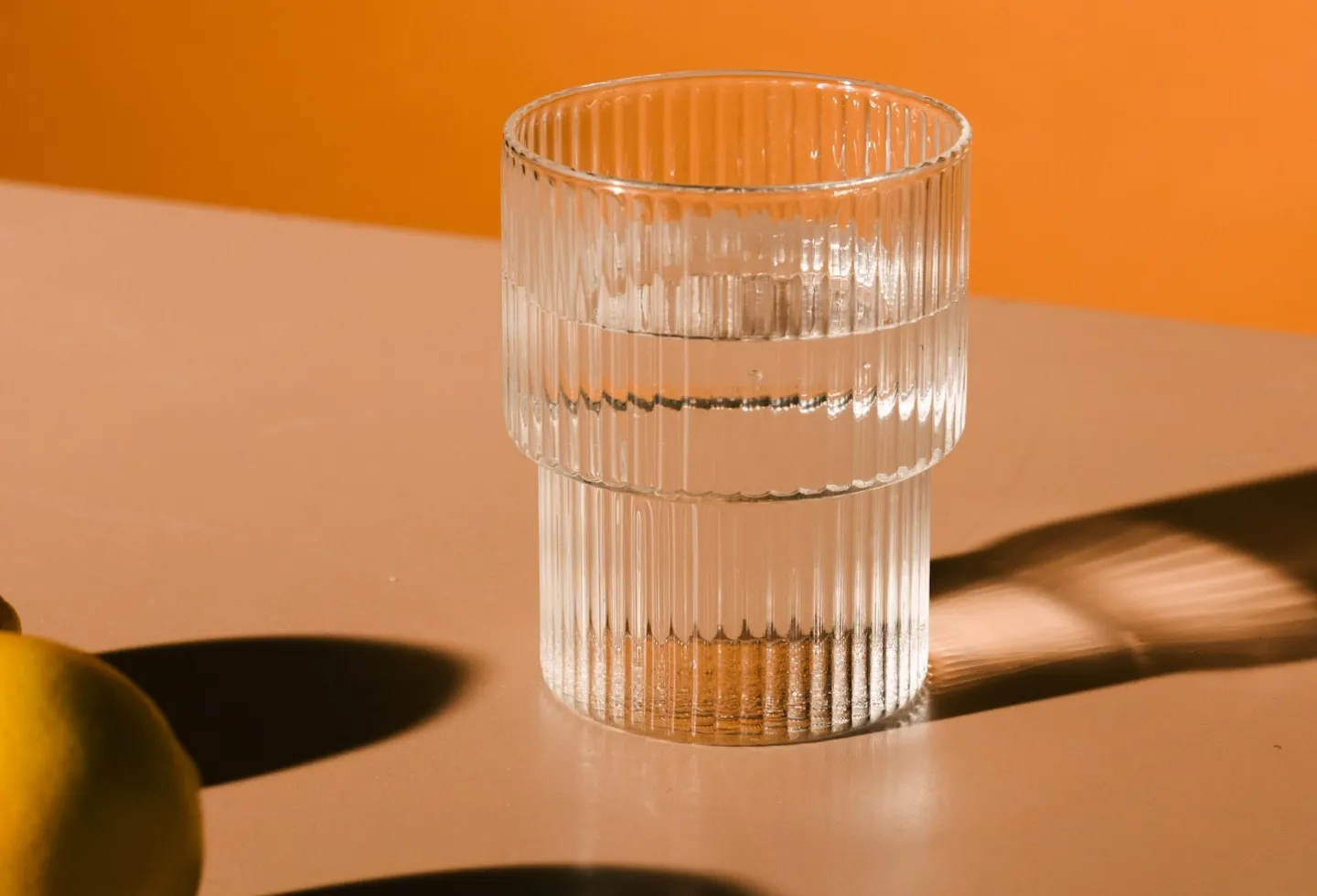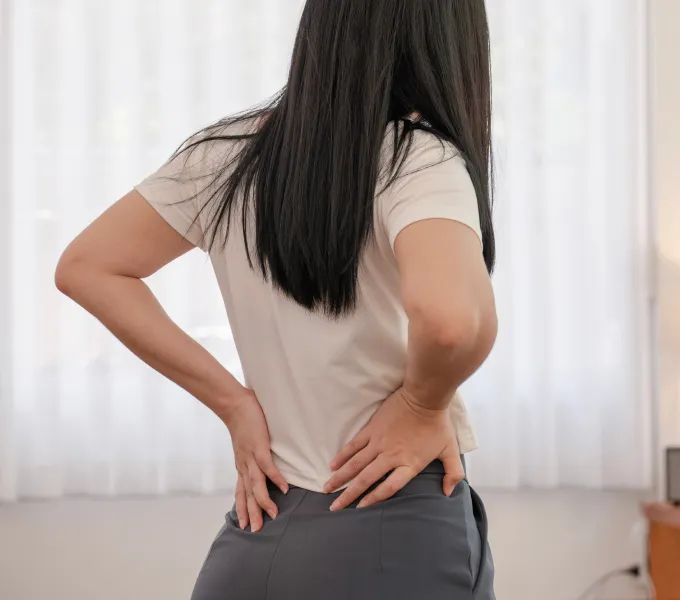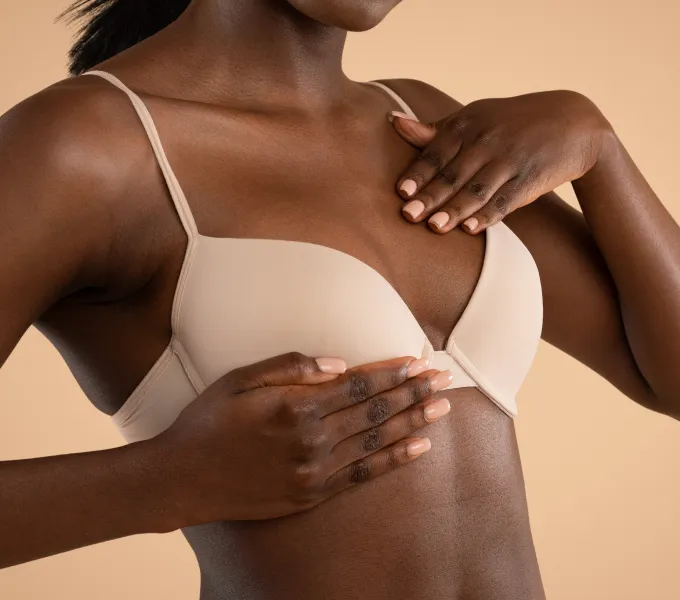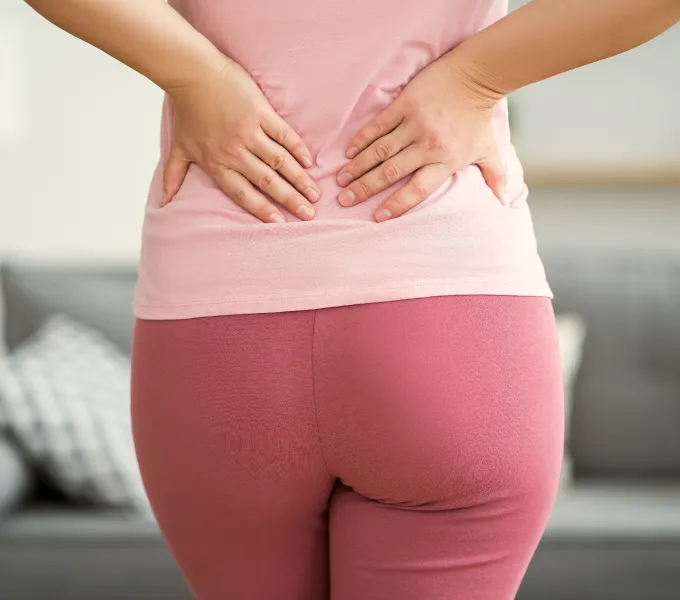
Hydration All Day Keeps the Back & Pelvic Pain Away!
Clinically reviewed by Liz Miracle, PT, MSPT, WCS.
Summer is here, bringing sunny skies, vacation opportunities, pool time… and for many folks, pelvic floor and back pain. What is the connection here? Let’s dig a little deeper and find out.
How Much Water Should I Drink?
Generalized guidelines on hydration are tricky, because so many factors can influence how much fluid intake you need, including:
- Level of Physical Activity
- Weather/Room temperature
- Sweating
- Kidney function/Kidney stones
- Pregnancy
- Breastfeeding/chestfeeding
- Health conditions like diabetes, heart issues, and vascular issues
The general guideline of “8 cups a day” doesn’t work for everyone– you may need more or less, depending on your personal factors! As a general rule, you should be drinking enough water to keep your urine pale yellow to clear, and peeing 7-11x/day. If you are sweating a great deal, it is important that you also consume electrolytes with your fluids, so that you are replenishing the minerals you are losing along with the water. If you are getting headaches, muscle cramps, or your urine is darker yellow or brown, these are all signs that you may be dehydrated.
Having a hard time drinking enough water? Try the following hydration tips:
- Cook foods with lots of fluid content, like soups and stews
- Eat fresh fruits and vegetables, which are naturally hydrating
- Add a little flavored electrolyte mix, or even just a pinch of salt and squirt of lemon juice to your water to improve its flavor and hydration ability. If you have an overactive bladder, try a less acidic add-in, like cucumber slices
- Make your own iced tea and keep it in a pitcher in the fridge. If you have bladder issues, stick to an herbal tea instead of a caffeinated one
Is Dehydration Connected to Back Pain?
Muscle cramps from dehydration can happen more in the summer, both because of the summer heat as well as a greater tendency to be physically active. It’s also easy to get dehydrated without realizing it in a pool or hot tub where you can’t feel yourself sweat..
There is another proposed connection between back pain and dehydration, which is that when the intervertebral discs (the cartilage discs between the bones of your spine which act as shock absorbers) are more dehydrated they are more prone to injury. Dehydration is also a risk factor for chronic UTIs which can lead to bladder and kidney infections. If you are experiencing intense lower back pain along with burning with urination, seek medical attention ASAP.
Is Back Pain Connected to Pelvic Floor Problems?
Researchers have long noted a connection between chronic back pain and pelvic floor dysfunction. Origin physical therapists see this often in the clinic: when a patient comes in with pelvic floor issues we ask about back pain, and vice versa. Usually the patient responds, “How did you know?”
What’s the connection?
The back muscles, core muscles, and pelvic floor muscles all work teeogether to stabilize the spine and torso. Often if there is dysfunction in one area of this system it affects the other areas as well. For example, if a person has weak abdominal muscles, that can mean that they tend to clench their pelvic floor and back muscles when they are standing or walking for longer periods of time, leading to pain. If someone is consistently standing or sitting with poor posture, that will affect all of those stabilizing systems as well.
Is Pelvic Pain Connected to Dehydration?
The main connection between pelvic pain and dehydrations via the bladder. If the bladder is chronically irritated it can spasm frequently and contribute to urinary urgency. This can often make you feel you have to run to the restroom, only to find that there was hardly any urine to void. Food and drinks that irritate the bladder will be more concentrated in the urine if you are dehydrated, worsening these issues.
Common bladder irritants:
- Caffeine
- Alcohol
- carbonated beverages
- Spicy foods
- Acidic/sour foods
- Artificial colors/sweeteners
Drinking too much water can also lead to more bladder overactivity, so it’s important to strike the right balance between these two ends of the spectrum. Tension in the pelvic floor is often present for people with bladder irritation, which can lead to pelvic pain, constipation, and other issues. Want more tips on reducing pelvic floor tension? Read more here. Good hydration is also important for keeping stools a good consistency for bowel movements, and if you are chronically constipated this can be its own cause of pain in the pelvis, abdomen, and lower back!
What’s the Connection between Dehydration and Urinary Incontinence?
If you are leaking pee, it’s a common tactic to reduce your fluid intake so you don’t have as much pee in your bladder to leak out. While this tactic can be effective to some extent, it’s important not to become dehydrated while trying to avoid leaks. There are many other ways to control urinary leakage that don’t have other ill effects on your health! However, it may be wise to alter when and how you are drinking fluids. Instead of chugging a lot of water all at once in the morning along with your coffee, consider sipping slowly throughout the day, so the bladder isn’t filling too quickly, making you more vulnerable to leakage.
If you are having a lot of urgency with your incontinence, you may benefit from reducing bladder irritants in your diet, as mentioned above. That doesn’t mean you have to immediately avoid all of these issues, but it may help you be strategic about what and how much you are having, and connect the dots between your symptoms and your biggest triggers. Drinking a little extra water with these irritating substances can help dilute them in your bladder, and help move them through your system more quickly. Pelvic floor physical therapy is also a very effective way to treat urinary incontinence. Book a visit with one of Origin’s physical therapists now to get personalized recommendations!
Don’t Wait to Get Help!
Both back pain and pelvic floor issues are best treated early on, and both can quite negatively affect quality of life, so it is important to seek help ASAP if you are experiencing problems! Book your first appointment with a physical therapist in just a few minutes here. Don’t let pain get in the way of a great summer! Even if you have been experiencing symptoms for a long time, it’s never too late to get help.
Sources Cited
M. Daudon et al. "Impact of fluid intake in the prevention of urinary system diseases: a brief review." Current Opinion in Nephrology and Hypertension, 22 (2013): S1–S10. https://doi.org/10.1097/MNH.0b013e328360a268.
Faizan-ul-Haq et al. "Characteristics of back pain in young adults and their relationship with dehydration: a cross sectional study." F1000Research (2020). https://doi.org/10.12688/f1000research.22298.1.
Gulhan Yilmaz Gokmen et al. "Cause of non-specific low back pain in women: pelvic floor muscle weakness." International Urogynecology Journal, 34 (2023): 2317 - 2323. https://doi.org/10.1007/s00192-023-05606-1.
Youngkyun Kim et al. "Effectiveness of Fluid and Caffeine Modifications on Symptoms in Adults With Overactive Bladder: A Systematic Review." International Neurourology Journal, 27 (2023): 23 - 35. https://doi.org/10.5213/inj.2346014.007.
Shellee L. Ogawa et al. "Is it Safe to Reduce Water Intake in the Overactive Bladder Population? A Systematic Review." The Journal of Urology, 200 (2018): 375–381. https://doi.org/10.1016/j.juro.2018.02.3089.
P. Pollintine et al. "Discogenic Origins of Spinal Instability." Spine, 30 (2005): 2621-2630. https://doi.org/10.1097/01.brs.0000188203.71182.c0.
K. Vincent et al. "An update on the management of chronic pelvic pain in women." Anaesthesia, 76 (2021). https://doi.org/10.1111/anae.15421.
Christina M Walsh et al. "Immediate Effects of Exercise and Behavioral Interventions for Pelvic Floor Dysfunction and Lumbopelvic Pain." Journal of Women's Health Physical Therapy (2020). https://doi.org/10.1097/JWH.0000000000000165.




